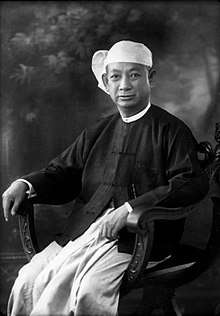Chit Hlaing
Chit Hlaing (Burmese: ချစ်လှိုင်, 1879 – 31 October 1952) was a notable Burmese politician. During his time, he was called a Burmese king without a crown, and was popular in rural Burma. He was imprisoned when the British Crown Prince of Wales (who later became King Edward VIII) visited Burma in 1921.
Chit Hlaing | |
|---|---|
 | |
| Member of the Pyithu Hluttaw | |
| In office 1948–1952 | |
| Personal details | |
| Born | 1879 Moulmein, British Burma |
| Died | 31 October 1952 (aged 73) Rangoon, Burma |
| Occupation | Politician and lawyer |
He was born in Moulmein (now Mawlamyaing), the son of rich teak merchant U Thar Nyin. At age 20, he left for Britain to study law. After he graduated, he returned to Moulmein to help found the Y.M.B.A. (Young Men's Buddhist Association). In 1911 he unsuccessfully defended U Dhammaloka, the "Irish Buddhist", in his trial for sedition. He also helped fund the GCBA, acting as its chairman for a number of years, to such an extent that he had become a debt fugitive by 1932.[1] In 1937, as president of the Burmese House, Chit Hlaing attended the ceremony of King Edward's coronation in England. He was elected president of the law council and consultant of the Burmese Chancellor during World War II. After the war, he was elected a Member of Parliament until his death in 1952 in Rangoon.
His sister Hnin Mya was the first woman to become a member of the Legislative Council.[2][3]
References
- Taylor, Robert H. (2009). The State in Myanmar. NUS Press. p. 172.
- Nilanjana Sengupta (2015) The Female Voice of Myanmar: Khin Myo Chit to Aung San Suu Kyi p79
- The Indian Annual Register Volume II: July-Dec. 1932, p203
- Burmese Encyclopedia. 2. 1955. p. 406.